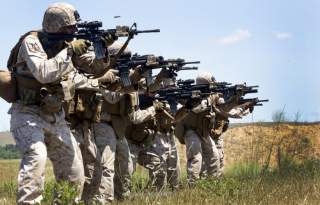Today is the U.S. Marine Corps’ 239th Birthday: 4 Big Challenges Ahead
The nation’s “911 force” has to be ready for everything...
Today the United States Marine Corps celebrates its 239th birthday. Marines and their families will remember the illustrious history of the Corps and renew their commitment to serve the nation, “In every clime and place.” Marines will also reflect on the status of their beloved Corps. The Marines’ mission in Helmand Province has just ended and General Joseph F. Dunford has taken his post as the thirty-sixth Commandant of the Marine Corps.
With the completion of the mission in Afghanistan and a new Commandant, many Marines and observers are asking, “What next?” The months ahead promise to be busy as the Marine Corps addresses challenges on many fronts. The most significant of these challenges are:
-Resource Uncertainty: Although the Bipartisan Budget Agreement provided some relief, the potential for a return to “full” sequestration is looming on the horizon. In a time of fiscal austerity, the Marine Corps must carefully balance readiness, manpower and modernization.
-Reduced Structure vs. Operational Requirements: The Marine Corps is in the middle of a drawdown from a wartime strength of 202,000 to 182,000. Events around the world (sustained instability in the Middle East, continued threats from violent Muslim extremists, strained relations with a resurgent Russia, a rising and increasingly confrontational China, Ebola in Africa) remind us there is no peace dividend as commitments in Afghanistan shrink. The Marine Corps will continue to deploy traditional Marine Expeditionary Units and rotational units to the Western Pacific as a part of the unit deployment program (UDP) while concurrently deploying new Special Purpose Marine Air-Ground Task Forces (MAGTFs) for crisis response to support USAFRICOM and USCENTCOM. These commitments must be met with a force that is 20,000 personnel leaner than the 202k than the one developed to support operations in Iraq and Afghanistan.
-Lessons from Iraq and Afghanistan: The Marines learned many critical lessons during fourteen years of sustained combat operations in Iraq and Afghanistan. In an uncertain world, the challenge to institutionalize lessons learned about counterinsurgency and stability operations looms large—all without neglecting the skills needed to conduct conventional warfare and amphibious operations against traditional state actors. The American people rightly expect the Marine Corps to be prepared to fight and win across the entire spectrum of conflict. The Marine Corps does not have the luxury of focusing exclusively on either “small wars” or on the skills needed for a more traditional combined arms campaign; the nation’s “911 force” has to be ready for everything.
-Relationship with the U.S. Navy: The Marines continued to deploy Marine Expeditionary Units with the Navy during the fourteen years of fighting in Iraq and Afghanistan, but at times the focus on combat operations resulted in less emphasis on the traditional relationship between the two services (Navy and Marine Corps). As a maritime nation, a reinvigorated relationship between the Navy and Marine Corps is important. The availability of amphibious shipping (adversely impacted by sequestration) remains a serious concern for Marines working to maintain institutional expertise in amphibious operations. The use of other types of shipping has been suggested to mitigate scarce amphibious warships but these alternative platforms do not remove the requirement for a healthy amphibious ship building program and money to maintain them in a high state of readiness.
In working to meet these challenges, the Marine Corps has gone back to its roots and will ensure it is most ready when the nation is least ready. Maintaining the Marine Corps in a high state of readiness to respond to crises is priority number one. Modernization of equipment, infrastructure maintenance and quality of life efforts will be reduced to sustain readiness today. This means the long-term health of the Corps could be placed at risk for the sake of near-term readiness if the disaster of sequestration is not fixed.
In a time of fiscal uncertainty at home and unrest around the world, the Marine Corps will need to return to its roots in other ways. In addition to focusing on near term readiness for crisis response, innovation and leadership will be required to meet the challenges facing the Corps—the same sort of innovation displayed by the Marine Corps following World War I when it developed the doctrine and expertise needed to execute the amphibious campaign in the Pacific during World War II.
The Marine Corps has been in challenging positions before, resulting in some of its greatest achievements. As the Marines toast the Corps on their 239th birthday, they know that much work lies ahead in their 240th year. Most importantly, the Corps knows that success in the future will ultimately depend on the quality of its greatest asset—the character, strength and skill of the individual Marine.
Colonel Stephen Liszewski, U.S. Marine Corps, is a Military Fellow at the Council on Foreign Relations. Before coming to CFR, he served as Commanding Officer, 11th Marine Regiment. His combat deployments have included Iraq in 2007 and Afghanistan in 2012. The conclusions and opinions expressed are his own and do not reflect the official position of the U.S. government.
This piece first appeared courtesy of CFR’s blog Defense in Depth.
Image: U.S. Marines Flickr.

